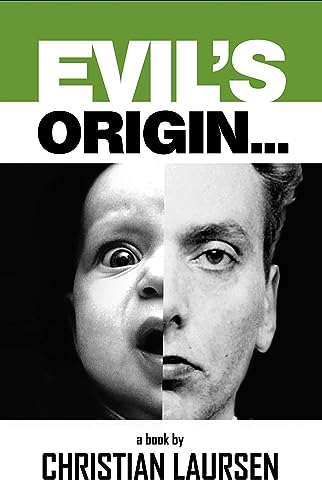Blurb:
For all good people of the world, this book is for you. The times we live are times we must wake up from our slumber. We are told evil is relative, a myth, but is this true? This book ventures into the darkest parts of the world, searching for the truth of evil. From Psychologists and Clinical professors, Neurologists to Anthropologists, Authors, Explorers, Journalists and stories of Survivors and Victims… The dots are connected one by one. Too often, different fields do not talk to each other, and specialized professions cannot touch sensitive matters. Which slows and even stops our ability to find the truth. This book’s initial purpose was to break free of these cultural chains, but the journey that started with this simple question, how to wake people up, became an answer… to what Evil’s Origin could be. If you are not afraid to look into the darkness, then this book is for you.
My Review:
Christian Laursen’s “Evil’s Origin” is a hauntingly intense exploration into the nature of evil. I was warned: this book is dark. The author delves into the unsettling topic of evil, a subject often avoided due to its grim nature. From rapists to murderers, and torturers who derive pleasure from others’ pain, the author spares no detail in painting a picture of humanity’s darkest facets.
Reading this book was undeniably heavy. The graphic depictions of cruelty and inhumanity are not for the faint-hearted. Yet, the author’s dedication to the topic is evident in his meticulous research and compelling narrative. The book is a valuable resource for everyone — men, women, children, parents — because it teaches lessons that are rarely discussed. We are often told not to talk to strangers, but no one prepares us to identify true evil among strangers and those closer to home.
The importance of this book cannot be overstated. It’s a must-read for anyone willing to confront the uncomfortable truths about the world. However, be prepared for its harrowing content. The descriptions of torture and death are explicit and unsettling, but if you can handle it, you’ll find this book incredibly enlightening.
The author argues persuasively against the relativism often associated with discussions of evil. He draws from philosophers and convincingly challenges their views, urging readers to question societal norms. He suggests that modern society, with its chaotic structures and shifting values, is complicit in obscuring the truth about evil.
One of the book’s most powerful messages is about the evolution of language. The author demonstrates how words like “evil” and “terror” have lost their impact through overuse and normalization. He forces readers to confront the true meaning of these terms by vividly illustrating the scenarios they describe.
He writes, “Evil is consciously and intentionally HARMING others WITHOUT REMORSE… combined with GETTING PLEASURE from harming others.”
“Evil’s Origin” will remain relevant for years to come. Its exploration of evil transcends cultural, geographical, and racial boundaries, emphasizing a universal distinction between decent and evil people. The book’s interdisciplinary approach—drawing from science, logic, and literature — adds depth to its investigation into what constitutes evil.
The book is a thesis emphasizing the first year of a child’s life as the primary determinant of their capacity for evil. I personally believe that while early childhood is undeniably crucial, it’s overly simplistic to attribute the origin of evil solely to this period. It’s an important perspective, but other significant factors that contribute to the development of evil also need to be considered. Probably, we can expect the author to come up with more books exploring other such factors.
What I found problematic was the author’s focus on the mother’s role (or lack thereof) in the creation of evil. He suggests that a mother must be with the child to provide them with deserved love and care throughout their first year. In modern dual-income households, it’s unrealistic to place the onus solely on mothers. Also, there could be various other reasons for the mother’s absence. A more holistic approach, involving the entire family and community, towards caring for the newborn is essential. The adage “it takes a village to raise a child” is particularly relevant here.
Despite these criticisms, the author’s work is commendable for its boldness and thoroughness. He has already accomplished a great deal by identifying a key cause of evil. His call to action for a collective societal effort to prevent the nurturing of evil from infancy is both timely and necessary.
In conclusion, “Evil’s Origin” is a profoundly impactful book. It challenges readers to confront the darkest aspects of humanity and compels them to think critically about the nature of evil. This book is an essential addition to the ongoing discourse on morality and human behaviour. It’s not just a book; it’s a wake-up call.

